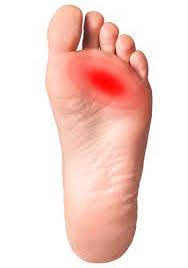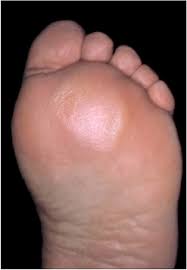
Les métatarsalgies
Definition
Metatarsalgia is consistent with pain at the top of the arch. This pain indicates inflammation of the front of the soles of the feet.
Metatarsals are the bones that allow the bones of the heel to join with those of the toes. Metatarsalgia refers to pain under the head of these metatarsals bones (on the side of the toes) on the soles of the feet. These pain may be related to bones, joints, or tendons.
Clinic
Pain can most often occur at the extended standing station, at the end of a certain walking perimeter, or spontaneously at the palpation. It usually sits in front of the heads of the 2nd, 3rd, and 4th metatarsal bones.
It often reflects an anterior hyper-support relative to the heel. Your body will respond to this hypersupport by thickening the skin, these are callus. The treatment with the pedicure erases the corn, but the remaining cause, they are reformed…
The causes of metatarsalgia can be diverse: excess length of a metatarsal bone, hallux valgus, Morton’s syndrome, repeated trauma bursitis, stress fracture, retraction of the Achilles tendon.
Standard x-rays are usual, supplemented according to the symptomatology by scanner or MRI.
Treatment
The treatment of metatarsalgia is based primarily on a correction of the favouring causes. Then you will be prescribed orthopedic soles, and if necessary self-training exercises.
In case of failure and abnormality of length, we can discuss an osteotomy (bone section) of shortening of the incriminated metatarsal. There are bone cutting techniques with (Weil’s osteotomy), and without metallic material (Helal’s osteotomy). This will harmonize the support on the whole plantar arch. The intervention takes place mostly in ambulatory surgery, under loco-regional anaesthesia. You will walk with a heel shoe (“discharge”) for 45 days.
Causal factors, such as hallux valgus, will also need to be addressed.



